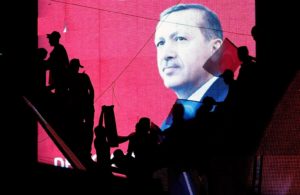Special to WorldTribune.com
PARIS — A vital American ally has gone geopolitically adrift in the wake of Turkey’s failed military coup, and the subsequent crackdown on all forms of domestic political dissent by the strongman ruler Recep Tayyip Erdogan.
The bloody coup in which hundreds died, nonetheless served as a tragic backdrop for what appears as a pre-planned crackdown by Erdogan loyalists on a wide swath of opposition forces. As importantly in the aftermath of the overthrow attempt, Erdogan has frayed already strained relations with the USA and the European Union.

The Coup
First let’s look at the coup attempt itself. Since 1960, Turkey’s military has seized and held power four times. The night of the Generals on 15 July looked like a rerun of past putsches except that the attempt seemed more ill-starred than the product of a well-trained NATO military. Though some army units were restive, the timing of the putsch may have been a premature or misjudged attempt by some military units who were provoked into action precisely as to then allow for Erdogan’s forces to launch a pre-planned counter-coup.
Why? Armored units went on to the streets and bridges on a busy Friday night; not in the quiet and wee hours of the next morning. Though the plotters seized some TV stations and key points in Istanbul and the capital Ankara, they failed to capture President Erdogan himself who then used TV to rally his loyalists to flood the streets. Bloody violence ensued.
In the coup’s immediate aftermath, Erdogan extolled, “This uprising is a gift from God to us because this will be a reason to cleanse our army.” His comments reflected a long simmering unease with the powerful Turkish military, a secular mainstay of the State which has never been comfortable with Erdogan’s Islamic path.
Erdogan, whose Islamic-lite AK party has been in power since 2002, has delivered impressive economic progress for the country, but has increasingly embraced the trappings of an autocratic Sultan more akin to leaders in the ex-Soviet-Stans than in Europe.
Fethullah Gulen, an Islamic cleric who was once an Erdogan ally but who now lives in exile in the USA has become the focus for Erdogan’s rancor. A systematic purge of suspected “Gulenist factions” has extended to the military, police, media, schoolteachers and civil servants and has reached 60,000 in the aftermath of the uprising.
Turkey’s large secular Muslim community is facing increasing pressures from AK zealots.
The failed July military coup was aimed at toppling Erdogan’s increasingly authoritarian rule which mixes Islam with high-octane nationalism. The government has since staged massive intoxicating patriotic rallies with a sea of crimson Turkish flags to burnish Erdogan’s emerging personality cult.
Conversely, Erdogan, never shy to crack down on the press, found the coup a perfect excuse to close over 100 media outlets according to the New York based Committee to Protect Journalists (CPJ) and carry out arrests or detentions of scores of media.
The Stakes
Turkey remains a strategic country at the crossroads of Europe and the Middle East, and has long presented a secular and stable model on the doorstep of the chaotic Middle East. Built on the secular, nationalistic, and modernizing model of founder Kemal Ataturk, the country is beset with ethnic divisions with the Kurdish minority and the refugee overflow from the Syrian conflict. Terrorism, both from Kurdish PKK separatists and Islamic State plague the county.
Long a reliable member of NATO, Turkey has Europe’s largest military, and has until recently been supportive of American efforts to attack Islamic State. The vital Incirlik airbase remains a crucial hub of American airstrikes on radical Islamic targets in Syria and Iraq. This may be changing as Erdogan angrily accuses Washington of plotting the attempted overthrow.
The Fallout
Erdogan was already playing a double game in the Syrian war; on the one hand he was trying to topple Assad and in doing so allowed Turkey to become a conduit for all sorts of radical Islamic jihadi fighters, many of them from Europe, to slip through Turkey’s porous border with Syria.
Nonetheless, Turkey has accepted a huge humanitarian burden of two million Syrian refugees, many of whom may later try to illegally go to Western Europe.
Erdogan has blackmailed the European Union by gaining aid in exchange for keeping refugees inside Turkey and not putting them on the road to European capitals. If slighted, Erdogan could open the migrant spigot and again allow waves of Syrians and Iraqis heading for Greece and beyond. Europe, who accepted over a million migrants last year, justifiably fears this outcome.
The USA seems to have been caught unaware of the impending coup but nonetheless is being callously blamed by President Erdogan’s minions of having orchestrated the bloody assault on democracy. Washington would be wise not to take the bait and instead work with and support secular, civil and democratic forces in this country at the crossroads.
John J. Metzler is a United Nations correspondent covering diplomatic and defense issues. He is the author of Divided Dynamism the Diplomacy of Separated Nations: Germany, Korea, China (2014). [See pre-2011 Archives]

